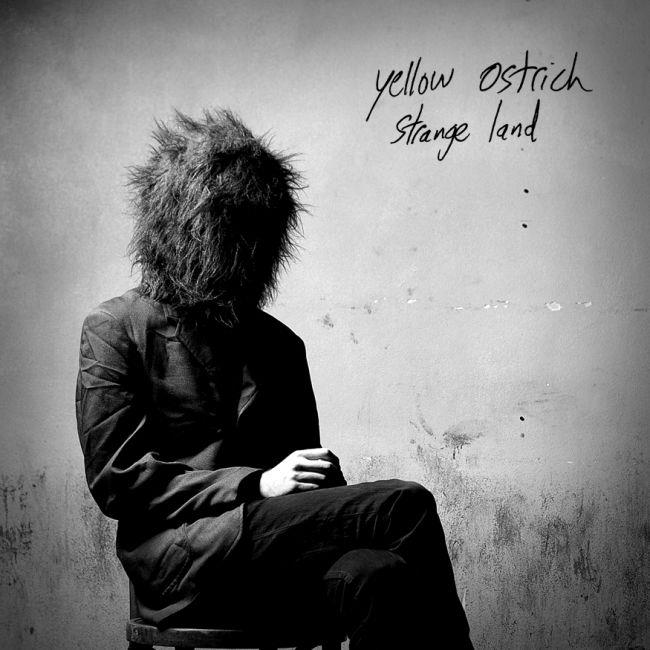At some point in 2009, Alex Schaaf converted his bedroom into a musical playground. His moniker was Yellow Ostrich, and his genre hinged on whatever he felt like releasing at the moment. Recording in his room gave him the freedom to experiment with different styles and textures on a low budget; his ventures ranged from heartrending acoustic movements to electropop Morgan Freeman tributes. When he settled into a folk-pop niche on his first proper album, The Mistress, he complemented catchy, stripped-down arrangements with a self-harmonizing choir of looped vocal melodies. Minimalism was king in the early incarnation of the project, with the songs only occasionally fleshing out into a big production.
Yellow Ostrich altogether eschews its “less is more” mentality on Strange Land, the project’s second release for Barsuk. The sound on this album is indeed full, due to Schaaf moving his music out of the bedroom and adding two more members to the mix. But as the group replaces slow-building vocals and skeletal soundscapes with heavier guitars and triumphant climaxes, originality goes missing from the picture. In a few noticeable instances on this album, Yellow Ostrich trades in its explorative tendencies for a few attempts at becoming a breakout indie rock band. “Stay At Home” channels familiar, feel-good anthems from the last ten years (namely “Are You Gonna Be My Girl” and “Last Nite”), and “The Shakedown” is a rough-and-tumble rocker that could get stadiums moving with ease. Accessibility isn’t a problem, per se – although derivative, those two songs are at least infectious. But Strange Land sometimes feels a bit manufactured, and miles away from the gripping quirkiness that made The Mistress a genuinely playful and unique listen.
Despite Strange Land’s vaguely commercialized air, the band pulls together some captivating tunes thanks to some impressively matured songwriting. Gone are the days of adventuring with whales and wondering how quickly libraries burn. Schaaf instead turns his attention towards physical and emotional distance, and trying to figure out one’s place in an uncompromising world. Album highlight “I Got No Time For You” exemplifies these conflicts. The track follows a man’s desperate desire to meet someone who died before he was born. He attempts to align his narrative with the deceased’s narrative: “When you were 17, I was / Nothing but a thought, because / You were then in ’53 / There’s nothing yet of me.” As these lines suggest, the characters of Strange Land tend to exist in different spheres, and the words are often delivered with a quavering, ghostly tone that reinforces that sense of alienation. Elsewhere, “Elephant King” revolves around the crisis of having no one to enjoy life with, and “Stay At Home” similarly narrates how two people are in love, but confined to separate houses.
But while the lyrical theme of separation remains consistent throughout, the music jumps all over the place dynamically. As a result, the palette of instruments and clean production that Yellow Ostrich introduces on Strange Land oftentimes distracts from the message. That’s not to say that there aren’t some strikingly beautiful moments on here, and that the band doesn’t use their new setup to their advantage. There is a moment on “Wear Suits” where an ambient horn whisper slowly engulfs the mix. The bottom then drops out, giving way to a cymbal rush and Schaaf’s boyish-yet-plaintive voice. Again, on closer “When All Is Dead,” an acoustic guitar opens with triplets, some quiet horns trickle in, and the lyrics describe waiting to love someone after everything else ceases to exist. It’s a moment that you want to remain quiet, and yet it bursts into unnecessary cacophony about halfway through. And on “Wear Suits,” the track shifts from ambiance back into a dull, percussive coda.
I’m not saying that Strange Land should allot to 43 minutes of quietude. On the contrary, this album could be comprised entirely of louder pieces and I wouldn’t mind it one bit. But there are so many ups and downs between songs and within songs that it all comes together like a byproduct of A.D.D. The intent was diversity, but the product is inconsistency. As a batch of indie rock songs, Strange Land isn’t bad at all – there are some memorable moments here. But as an album, it’s ultimately too bogged down by its professionalism and erraticism to come together very well.

